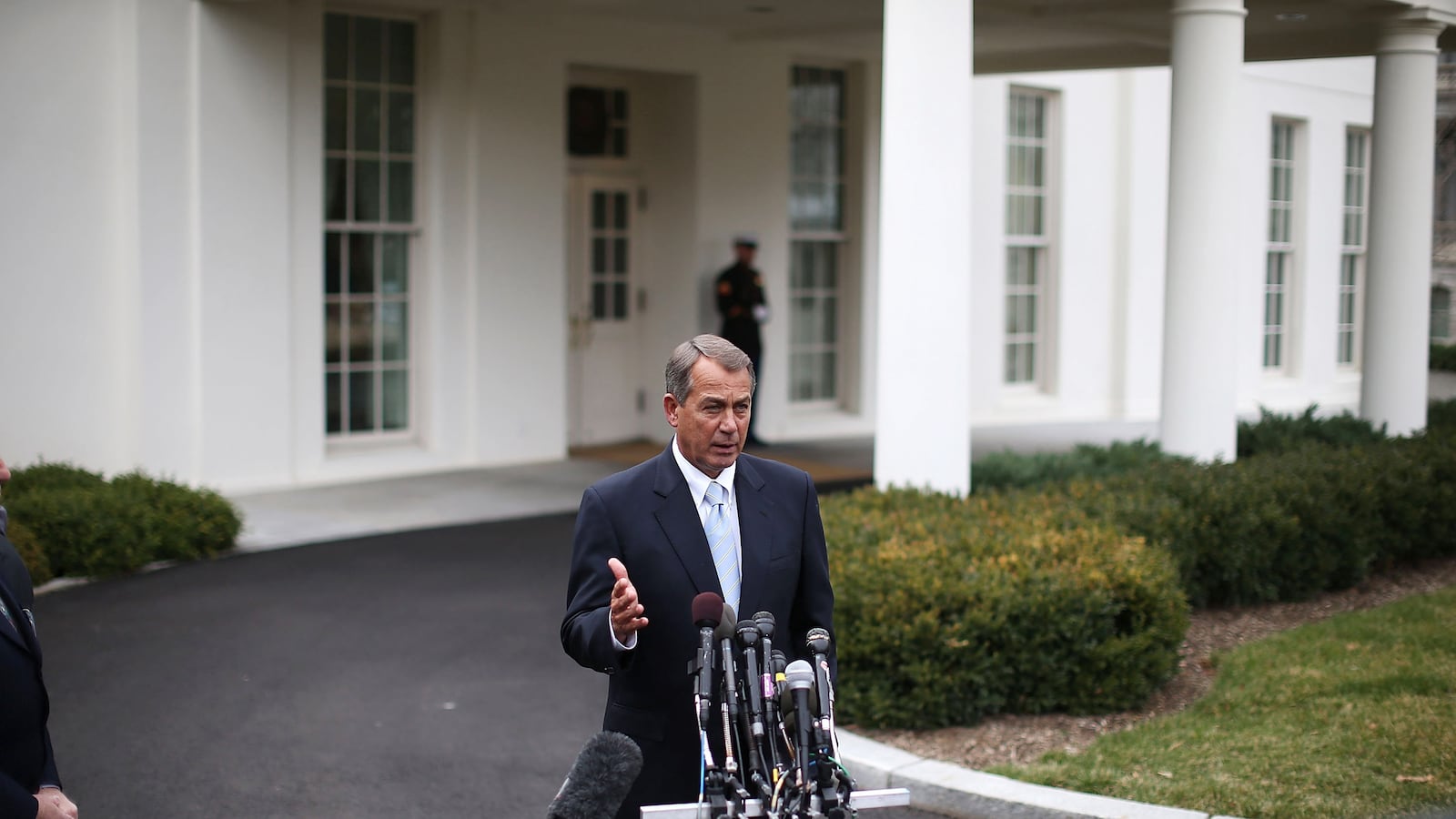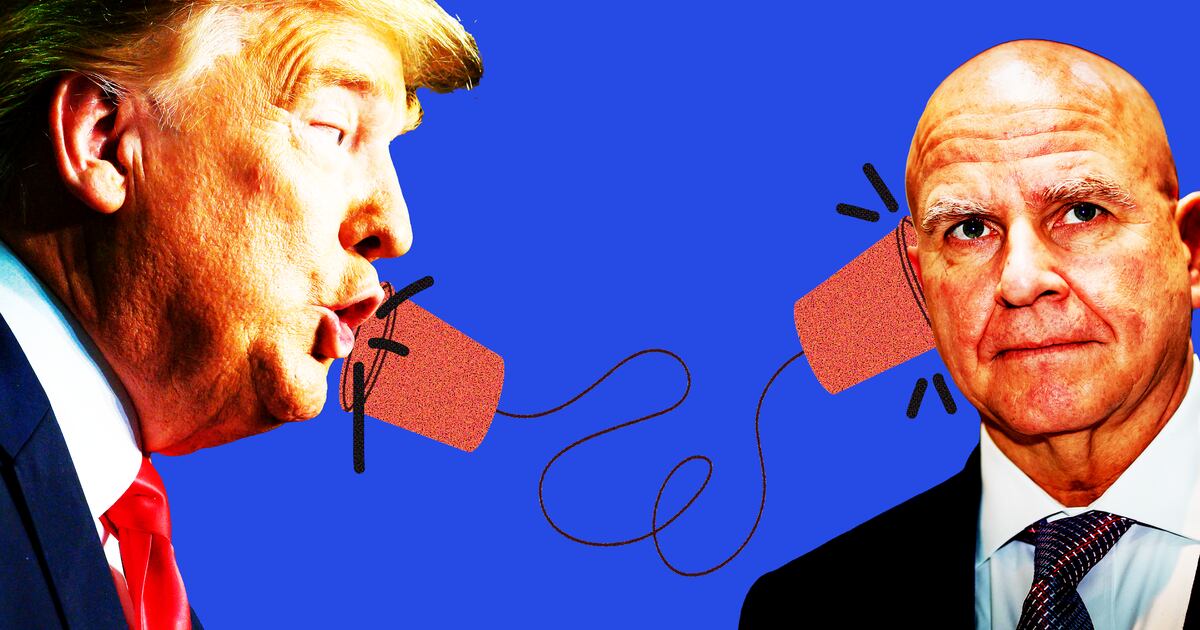The new normal is government by exhaustion.
Having lost the ability to make deals, the two parties now settle for whatever dumb, illogical, shortsighted arrangement doesn’t require them to do anything. There’s nothing left in the tank. The two sides can barely rouse themselves to deliver their tired talking points, which everyone is sick of.

That’s how the dreaded sequester, once described as draconian and unthinkable, became law over the weekend. And why we’re now stuck with it for months, or maybe longer.
The meeting that President Obama held with Republican leaders Friday perfectly captured the state of Beltway dysfunction—short, symbolic, and utterly meaningless. They achieved no Jedi mind-meld, or any other kind of meld, for that matter.
“I don’t think anyone quite understands how it gets resolved,” House Speaker John Boehner said Sunday on Meet the Press. And neither does anyone else. Boehner blamed Obama, and White House economic adviser Gene Sperling blamed the Republicans on several Sunday shows, when he wasn’t trying to patch up his feud with Bob Woodward by calling him a “legend.”
Obama may have the upper hand, according to the polls, with more Americans blaming the GOP for the impasse. But at some point, the widespread disgust with Washington is going to tar both parties.
The president may have miscalculated in overdramatizing the pain of the sequester cuts. For one thing, his barnstorming—and use of Cabinet members to warn of near Armageddon—did not pay off, failing to budge Republican leaders.
More importantly, if the sky-is-falling predictions of flight delays, criminals going free, and more people dying of cancer fail to materialize, the president will look like he engaged in political hype. The reporting on this subject has generally been of the “he said/she said” variety, but The Washington Post, for one, proved that Education Secretary Arne Duncan was wrong in claiming that there are “literally teachers now who are getting pink slips” because of the sequester.
Over time, the $85 billion in budget cuts this fiscal year will hurt the economy and cost hundreds of thousands of jobs, according to independent estimates. But the drip-drip-drip nature of these reductions failed to push the White House or Boehner into compromise mode. Each ultimately fears a worse outcome than sequestration—hacking at entitlement programs for the Democrats; swallowing another major tax hike for the Republicans.
The result is a passive-aggressive approach to governing: aggressive in terms of posturing, but passive when it comes to actually doing anything.
That’s been the pattern for two years now. The great debt-ceiling crisis of 2011 was initiated entirely by the Republicans refusing to do anything—that is, refusing to take the routine vote to pay the debts that Congress had already incurred. By the time they blinked at the last minute, the country’s credit rating had been damaged.
The face-saving compromise that saved the country from default was simply a promise to deal with the deficit later. The two sides set up the supercommittee, which fell far short of super. The best this lame panel could do was agree to the sequester—the unthinkable cuts that would not take place until the beginning of 2013. Thus our political leaders decreed that they could not cut spending without a gun to their heads, so the automatic trigger would force them to compromise. Once again, government by inaction.
First came the fiscal cliff, where the president had a big advantage: he could win by doing nothing. With the Bush tax cuts scheduled to expire on New Year’s Eve, Obama said he would allow that to happen unless the Republicans agreed to let them lapse for the wealthiest Americans, thus sparing the other 98 percent. The GOP caved because it’s impossible to win when the other side doesn’t have to lift a finger.
The shoe was on the other foot for the sequester showdown: the Republicans could finally achieve the deep spending cuts they have craved by doing zilch. Of course, they are dumb, across-the-board cuts, and half of them fall on the Pentagon, the party’s sacred cow. But Boehner seemed to enjoy refusing to negotiate with Obama, and the president wasn’t determined enough to strike a deal by offering deep alternative cuts. So both sides did what they do best: nothing.
Get used to it. You’ll be getting nothing from Washington for quite awhile.
Oh, there may be a modest compromise on background checks for gun sales. And while the contours of a deal on immigration reform are in sight, don’t underestimate the ability of the White House and Congress to do nada instead.
The truth is that this rolling series of faux crises have become deadly dull. In a Washington Post–Pew Research Center survey, only a quarter of those questioned said they were following the sequester battle closely. Most people instinctively understand that the deadlines and the air of drama are fake, that the politicians could make progress in solving these problems but choose not to. So they’ve stopped paying attention.
And that may be a perfectly rational response to a capital that has perfected the art of doing nothing but doing it loudly.





